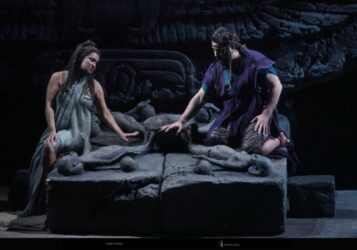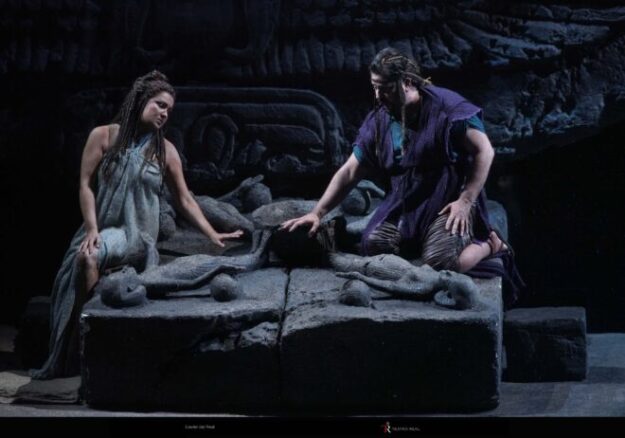
 Spain Verdi, Aida: Chorus and Orchestra of the Teatro Real / Nicola Luisotti (conductor). Teatro Real, Madrid, 24, 25, 26.10.2022. (JMI)
Spain Verdi, Aida: Chorus and Orchestra of the Teatro Real / Nicola Luisotti (conductor). Teatro Real, Madrid, 24, 25, 26.10.2022. (JMI)
Production:
Director, Sets and Costumes – Hugo de Ana
Lighting – Vinicio Cheli
Choreography – Leda Lojodice
Video – Sergio Metalli
Cast:
Aida – Krassimira Stoyanova / Anna Netrebko / Roberta Mantegna
Radamés – Piotr Beczała / Yusif Eyvazov / Jorge de León
Amneris – Jamie Barton / Ketewan Kemoklidze / Sonia Ganassi
Amonasro – Carlos Álvarez / Artur Ruciński / Gevorg Hakobyan
Ramfis – Alexander Vinogradov / Jongmin Park / Simón Orfila
The King of Egypt – Deyan Vatchkov
Messenger – Fabián Lara
Priestess – Marta Bauza / Jacquelina Livieri
Teatro Real opened the new opera season with this Verdi masterpiece and the presence in the Royal box of King Felipe and Queen Letizia, who were received with applause by the public.
For such a special occasion Teatro Real, decided to again stage the well-known Aida by Hugo de Ana (a co-production with the Abu Dhabi Festival) which premiered here in 1998 and was revived in 2018. It mirrors the usual concept of his works: large sets, brilliant costumes and poor stage direction. In this case, it seemed as if we had been transferred to the Verona Arena, which has held numerous de Ana stagings.
De Ana has revised the original staging and made some changes, among them a number of video projections. Of course, we are in clearly in Egypt, with an obelisk in Act I and pyramids in the background. The Triumphal March takes place in a sort of Roman theater with stairs on which the chorus is placed.
As in 2018, the musical direction was under Nicola Luisotti, whose reading had two different parts. The first two acts were rather flat and even noisy, not what I expect from this outstanding maestro, and especially in Verdi operas. Fortunately, things improved remarkably in the last two acts, where there was the emotion I had missed in the first half. The Teatro Real orchestra and chorus gave fine performances.
In the first cast, Aida was performed by soprano Krassimira Stoyanova who – if I am not mistaken – was making her debut at Teatro Real. Her voice is well-suited to the part, and she is a remarkable singer, but she needs more personality in her singing to be a true star.
The cancellations of singers and their corresponding substitutions are a big problem that opera houses and aficionados have to deal with frequently. At Teatro Real, we witnessed one of the very few occasions where the cancellations and substitutions have been received with joy by the public. A few days ago, María Agresta, who was to sing the part of Aida, cancelled. It was announced that the singer replacing her was none other than Anna Netrebko, who previously had already been booked to sing two performances and had now added another three.

Netrebko performed at the level of what one expects from such a great soprano. She is an accomplished stage performer whose voice continues to have a superb quality like few others, with an exquisite singing line in which her pianissimos stood out. I want to highlight her scene on the Nile in Act III, where ‘O, patria mia’ was one of those arias one will hear sung and will be long remembered.
The next Aida was soprano Roberta Mantegna, who confirmed the impression she left on me the first time I saw her on stage. Her middle range is fine, but the color changes and becomes more metallic and less attractive as the range rises. For my taste, she was less successful than the two Aidas who preceded her.
Radamés was played in the first cast by tenor Piotr Beczała, who is undoubtedly one of the most prominent singers nowadays. He has a beautiful voice that he employs well in the service of the character and was at his best in the last two acts. The following day, Radamés was sung by tenor Yusif Eyvazov. His voice has amplitude, and he sings correctly. He was clearly less convincing than Beczała the day before, but he did well, and is a fine singer whether frequently alongside Netrebko or in his own right.
The third Radamés was Jorge de León, whom I had not seen on stage for three years. At that time, I found him in excellent voice, but he was less convincing here. He has a noticeable vibrato, although things improved as his voice warmed up. I am not revealing a secret by saying that his ‘Celeste Aida’ ended in a top note at full voice, held for a long time.
Amneris in the first cast was mezzo-soprano Jamie Barton, who returned to the Teatro Real after her magnificent performance in the La favorite concert five years ago. She was outstanding as the Pharaoh’s daughter after the first scene, where I was surprised by the fact that she was almost inaudible. Fortunately, things normalized, and one could enjoy her beautiful, wide voice. The following day, Amneris was sung by Ketewan Kemoklidze. She has a voice of a certain quality and sings with expression, but her voice does not respond to the demands of the role – she sounds more like a soprano than a mezzo.
Mezzo-soprano Sonia Ganassi is a singer who has developed her career in bel canto operas, and her Amneris got my attention. It is an important change of repertoire, and she was not comfortable – her voice is not suited for this type of character. She clearly held back in Act I to be able to get to the big scene of Act III, which she handled well but without brilliance.
In the first cast, Amonasro was sung by baritone Carlos Álvarez, luxury casting for a character who, despite being important, is not one of the main protagonists. He was fine, although it seemed to me that his voice did not have the fullness of previous times. Baritone Artur Ruciński was good in the part, and has a voice suited to the role. The third Amonasro was Gevorg Hakobyan, who offered an appropriate voice.
There were good performances by Alexander Vinogradov, Jongmin Park and Simón Orfila as Ramfis, the High Priest. I found Deyan Vatchkov as the King disappointing and below what is required in a house of this importance. In the secondary characters, I would note Fabián Lara in the part of the Messenger, and sopranos Marta Bauza and Jacquelina Livieri as the Priestess.
José M. Irurzun
